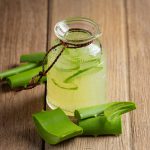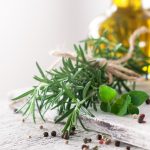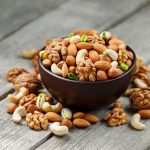Aloe vera plant has been used for its medicinal, skincare, and health benefits for centuries…
Read MoreWe know that the way we feel and our overall wellness is intrinsically connected to our gut health and how we digest our food. The liver has a huge role to play in this. It is often called the engine of the body and is a vital organ that plays a critical role in metabolism, digestion, detoxification, and vitamin storage in the body.[1]Kalra, Arjun, Ekrem Yetiskul, Chase J. Wehrle, and Faiz Tuma. “Physiology, liver.” (2018). So it is vitally important to maintain a healthy liver.
When we consume food, it is the liver that converts food into nutrients that our body can use. It is also the liver that renders toxic substances (ama) harmless so that they can be safely excreted from the body. Today, our modern lifestyle that is mostly sedentary and involves the consumption of junk food on a regular basis takes a toll on our liver. Non-alcoholic fatty liver disease (NAFLD) is a globally leading cause of liver disease.[2]Farzaei, Mohammad Hosein, Mahdi Zobeiri, Fatemeh Parvizi, Fardous F. El-Senduny, Ilias Marmouzi, Ericsson Coy-Barrera, Rozita Naseri, Seyed Mohammad Nabavi, Roja Rahimi, and Mohammad Abdollahi. … Continue reading
The liver, known as ‘yakna’ or ‘takima’ in the vedas, is an organ that helps in chayapachaya (digestion) of food. It has also been called jyotisthana, yakrit khanda, yakrit pinda. The liver is responsible for converting the rasa dhatu (clear plasma) to rakta dhatu (blood), identifying the toxins in the rasa dhatu, and storing them to ensure that they don’t enter the bloodstream. The bile produced by the liver breaks down fatty acids in our food and helps us digest them; the liver produces substances that help in clotting blood, but it also produces protective elements that prevent the formation of blood clots in our circulatory system.
But this is not all. This powerhouse of an organ also converts excess sugar to glycogen and stores it for future use, when the body may need it, and also synthesizes proteins and cholesterol.[3]“Ayurvedic Perspective of Liver”. National Health Portal. 7 May 2015. (Ayurvedic Perspective of Liver | National Health Portal of India (nhp.gov.in))
Most of the diseases that we suffer from today are a result of a poor lifestyle. Liver-related morbidities are no exception. Here are some lifestyle-related causes of liver damage:
The liver is the seat of pitta or the fire element in our body. Ayurveda describes it as a fiery hot organ, which is connected with agni (the fire principle). To keep the liver in good health and ensure that it is functioning smoothly, one needs to consume pitta-pacifying foods or pitta-nashak ahara.
Here are the foods that can help you maintain liver health as per ayurveda:
Foods that enhance pitta are best avoided. These include salty and sour foods.
Apart from the general practices, specific treatments like nitya virechana (controlled purgation) and vamana (elimination of waste through the mouth) help in correcting metabolic error.
How to improve liver health? Ayurveda is a holistic system of wellness and, according to ayurveda, it is not only what we consume that affects our liver health but factors like meal timing, emotions, and hormones also play a role. Here are some guidelines on how to improve liver health:
While ayurveda recommends some potent herbs that help in detoxifying the body naturally, there are a number of herbs like milk thistle (a staple in Mediterranean diets) that enhance liver function. Here are 11 trusted herbs that can boost your liver function:
Turmeric is often called the ‘Indian saffron’. Curcumin present in the bright yellow Curcuma longa or turmeric helps in fighting oxidative stress that is often associated with liver disorders. Curcumin is a free-radical scavenger and effectively gets rid of dangerous free radicals that are very harmful to our bodies. Research has also proved its efficacy in the prevention of fibrosis in the liver helping maintain a healthy liver.[8]Farzaei, Mohammad Hosein, Mahdi Zobeiri, Fatemeh Parvizi, Fardous F. El-Senduny, Ilias Marmouzi, Ericsson Coy-Barrera, Rozita Naseri, Seyed Mohammad Nabavi, Roja Rahimi, and Mohammad Abdollahi. … Continue reading
Aloe Vera (aka kumari) has been traditionally used in ayurveda to improve digestion. Aloe vera stimulates the production of bile which enhances liver function and boost healthy liver function. Recent research on rats proved that aloe vera has hepatoprotective properties and can restore the normal levels of liver enzymes.[9]Nahar, Taslima, Borhan Uddin, Shahdat Hossain, Abdul Mannan Sikder, and Sohel Ahmed. “Aloe vera gel protects the liver from oxidative stress-induced damage in an experimental rat model.” … Continue reading (Aloe vera gel protects the liver from oxidative stress-induced damage in an experimental rat model – PubMed (nih.gov))
Amakaki or the Indian gooseberry is a potent ayurvedic herb that is also a powerful antioxidant and has anti-inflammatory (shodhganga) properties. It neutralizes toxins and protects the liver from oxidative damage. Research has shown that amla can improve the hepatotoxic effects caused by substances like paracetamol, ethanol, and iron overload that reduce the load on the liver and maintain healthy liver functions.[10]Thilakchand, Karadka Ramdas, Rashmi Teresa Mathai, Paul Simon, Rithin T. Ravi, Manjeshwar Poonam Baliga-Rao, and Manjeshwar Shrinath Baliga. “Hepatoprotective properties of the Indian … Continue reading
Research has proved that the anti-inflammatory and antioxidant properties of licorice are particularly effective against alcohol-induced liver damage and maintain healthy liver function. A study proved that licorice treatment was successful in combating the changes induced by alcohol such as elevated levels of triglycerides and lipid accumulation.[12]Jung, Jae-Chul, Yun-Hee Lee, Sou Hyun Kim, Keuk-Jun Kim, Kyung-Mi Kim, Seikwan Oh, and Young-Suk Jung. “Hepatoprotective effect of licorice, the root of Glycyrrhiza uralensis Fischer, in … Continue reading
Found in the Himalayan region of the Indian subcontinent, Kutki is an important medicinal plant that is known to be beneficial for treating liver disorders and maintaining healthy liver function. It has antimicrobial, antioxidant, and hepatoprotective properties.[13]Masood, Maria, Muhammad Arshad, Qureshi Rahmatullh, Sidra Sabir, Muhammad Shoaib, Huma Qureshi Amjad, and Zainab Tahir. “02. Picrorhiza kurroa: An ethnopharmacologically important plant species … Continue reading (02. Picrorhiza kurroa: An ethnopharmacologically important plant species of Himalayan region | Pure and Applied Biology (PAB) (thepab.org)) Kutki is bitter in taste and is considered a coolant. It removes excess pitta and restores normal liver function. In ancient texts, kutki has been mentioned as a herb that prevents liver infection (yakrit vikara).
A member of the daisy family and often considered a weed, milk thistle has been used to treat liver and gallbladder disorders by ancient physicians and herbalists. Milk thistle, as suggested by the evidence, might contain hepatoprotective (liver-protecting) properties because it is an antioxidant and an anti-inflammatory substance.[14]Mulrow, C., V. Lawrence, B. Jacobs, C. Dennehy, J. Sapp, G. Ramirez, C. Aguilar et al. “Milk thistle: effects on liver disease and cirrhosis and clinical adverse effects: summary.” In … Continue reading
Drinking green tea for its myriad health benefits has become a trend. Green tea originated in China and Southeast Asia and is now an immensely popular beverage. Is it really beneficial? Research has proven that green tea is indeed beneficial for reducing the risk of liver disease.[15]Yin, Xueru, Jiqiao Yang, Tony Li, Liyan Song, Tinglu Han, Mei Yang, Huihua Liao, Jianjun He, and Xiaozhu Zhong. “The effect of green tea intake on risk of liver disease: a meta analysis.” … Continue reading Green tea helps in lipid metabolism and has a good quantity of polyphenolic antioxidants that can prevent malignant changes. Studies have shown that it has a protective effect on the liver.
Ginseng roots have been used in traditional Chinese medicine to treat diabetes, hepatic (liver-related) injury, and inflammation. Research has proved Ginseng’s efficacy to reverse liver damage caused by chemicals and hepatitis viruses. The unique constituents of ginseng aid in liver regeneration through anti-oxidative and anti-inflammatory mechanisms.[17]Kim, Tae-Woo. “Ginseng for liver injury: Friend or foe?.” Medicines 3, no. 4 (2016): 33. From a therapeutic perspective, ginseng can offer preventive therapy for common liver diseases like cirrhosis, fatty liver, and chronic hepatitis.[18]Huu Tung, Nguyen, Takuhiro Uto, Osamu Morinaga, Young Ho Kim, and Yukihiro Shoyama. “Pharmacological effects of ginseng on liver functions and diseases: a minireview.” Evidence-Based … Continue reading
Liver disease is often associated with obesity and insulin resistance. Ginger is an antioxidant, hypolipidemic (decreases the level of lipids or fat in the blood), and insulin-sensitizer and reduces insulin resistance. Lifestyle modification goes a long way in treating non-alcoholic fatty liver disease, and consuming ginger can enhance the effects of the lifestyle changes. In a study, people who consumed 2 grams of the ginger supplement daily, in addition to making other lifestyle modifications, witnessed a lowering of several inflammation markers.[19]Rahimlou, Mehran, Zahra Yari, Azita Hekmatdoost, Seyed Moayed Alavian, and Seyed Ali Keshavarz. “Ginger supplementation in nonalcoholic fatty liver disease: a randomized, double-blind, … Continue reading
Raw garlic consumption has been associated with the treatment of various non-alcoholic fatty liver diseases. The compounds in garlic treat lipid metabolism disorders. Allicin, the main sulphur-containing compound in raw garlic, reduces oxidative damage.[20]Zhang, Shunming, Yeqing Gu, Liu Wang, Qing Zhang, Li Liu, Min Lu, Ge Meng et al. “Association between dietary raw garlic intake and newly diagnosed nonalcoholic fatty liver disease: a … Continue reading
This is derived from the dried leaves of the ginkgo tree that is native to China. Ginkgo biloba is often used in dietary supplements and also liver health supplements. The extracts of ginkgo biloba, according to research, act as an anti-fibrotic agent that prevents fibrosis in the liver that results from chronic inflammation.[21]Wang, Yuanyuan, Rong Wang, Yujie Wang, Ruqin Peng, Yan Wu, and Yongfang Yuan. “Ginkgo biloba extract mitigates liver fibrosis and apoptosis by regulating p38 MAPK, NF-κB/IκBα, and Bcl-2/Bax … Continue reading (Ginkgo biloba extract mitigates liver fibrosis and apoptosis by regulating p38 MAPK, NF-κB/IκBα, and Bcl-2/Bax signaling (nih.gov)) A recent study proved that the ginkgo biloba extracts could be effective in reducing triglycerides in the liver, which in turn means that it can be beneficial in treating fatty liver.[22]Wang, Shi Dong, Zuo Quan Xie, Jia Chen, Ke Wang, Ting Wei, Ai Hua Zhao, and Qing Hua Zhang. “Inhibitory effect of G inkgo biloba extract on fatty liver: Regulation of carnitine … Continue reading
While these herbs are potent antidotes to liver damage, they must be complemented with the necessary lifestyle changes. We should not forget that ayurveda, or indeed any herbal remedy, adopts a holistic approach to treat any ailment in the body. We must pay attention to our diet, include physical activity, and get adequate sleep to ensure that our liver remains healthy.
References
| ↑1 | Kalra, Arjun, Ekrem Yetiskul, Chase J. Wehrle, and Faiz Tuma. “Physiology, liver.” (2018). |
|---|---|
| ↑2, ↑8 | Farzaei, Mohammad Hosein, Mahdi Zobeiri, Fatemeh Parvizi, Fardous F. El-Senduny, Ilias Marmouzi, Ericsson Coy-Barrera, Rozita Naseri, Seyed Mohammad Nabavi, Roja Rahimi, and Mohammad Abdollahi. “Curcumin in liver diseases: a systematic review of the cellular mechanisms of oxidative stress and clinical perspective.” Nutrients 10, no. 7 (2018): 855. |
| ↑3, ↑7 | “Ayurvedic Perspective of Liver”. National Health Portal. 7 May 2015. |
| ↑4 | El-Zayadi, Abdel-Rahman. “Heavy smoking and liver.” World journal of gastroenterology: WJG 12, no. 38 (2006): 6098. |
| ↑5 | Oh, Sechang, Takashi Shida, Kazumasa Yamagishi, Kiyoji Tanaka, Rina So, Takehiko Tsujimoto, and Junichi Shoda. “Moderate to vigorous physical activity volume is an important factor for managing nonalcoholic fatty liver disease: a retrospective study.” Hepatology 61, no. 4 (2015): 1205-1215. |
| ↑6 | Nivukoski, Ulla, Markus Niemelä, Aini Bloigu, Risto Bloigu, Mauri Aalto, Tiina Laatikainen, and Onni Niemelä. “Combined effects of lifestyle risk factors on fatty liver index.” BMC gastroenterology 20, no. 1 (2020): 1-10. |
| ↑9 | Nahar, Taslima, Borhan Uddin, Shahdat Hossain, Abdul Mannan Sikder, and Sohel Ahmed. “Aloe vera gel protects the liver from oxidative stress-induced damage in an experimental rat model.” Journal of Complementary and Integrative Medicine 10, no. 1 (2013): 47-53. |
| ↑10 | Thilakchand, Karadka Ramdas, Rashmi Teresa Mathai, Paul Simon, Rithin T. Ravi, Manjeshwar Poonam Baliga-Rao, and Manjeshwar Shrinath Baliga. “Hepatoprotective properties of the Indian gooseberry (Emblica officinalis Gaertn): a review.” Food & function 4, no. 10 (2013): 1431-1441. |
| ↑11 | Hashem-Dabaghian, Fataneh, Mojtaba Ziaee, Samad Ghaffari, Farzaneh Nabati, and Saeed Kianbakht. “A systematic review on the cardiovascular pharmacology of Emblica officinalis Gaertn.” Journal of cardiovascular and thoracic research 10, no. 3 (2018): 118. |
| ↑12 | Jung, Jae-Chul, Yun-Hee Lee, Sou Hyun Kim, Keuk-Jun Kim, Kyung-Mi Kim, Seikwan Oh, and Young-Suk Jung. “Hepatoprotective effect of licorice, the root of Glycyrrhiza uralensis Fischer, in alcohol-induced fatty liver disease.” BMC Complementary and Alternative Medicine 16, no. 1 (2015): 1-10. |
| ↑13 | Masood, Maria, Muhammad Arshad, Qureshi Rahmatullh, Sidra Sabir, Muhammad Shoaib, Huma Qureshi Amjad, and Zainab Tahir. “02. Picrorhiza kurroa: An ethnopharmacologically important plant species of Himalayan region.” Pure and Applied Biology (PAB) 4, no. 3 (2021): 407-417. |
| ↑14 | Mulrow, C., V. Lawrence, B. Jacobs, C. Dennehy, J. Sapp, G. Ramirez, C. Aguilar et al. “Milk thistle: effects on liver disease and cirrhosis and clinical adverse effects: summary.” In AHRQ Evidence Report Summaries. Agency for Healthcare Research and Quality (US), 2000. |
| ↑15 | Yin, Xueru, Jiqiao Yang, Tony Li, Liyan Song, Tinglu Han, Mei Yang, Huihua Liao, Jianjun He, and Xiaozhu Zhong. “The effect of green tea intake on risk of liver disease: a meta analysis.” International journal of clinical and experimental medicine 8, no. 6 (2015): 8339. |
| ↑16 | Molinari, Michele, Kymberly DS Watt, Thomas Kruszyna, Rebecca Nelson, Mark Walsh, Weei‐Yuan Huang, Bjorn Nashan, and Kevork Peltekian. “Acute liver failure induced by green tea extracts: case report and review of the literature.” Liver transplantation 12, no. 12 (2006): 1892-1895. |
| ↑17 | Kim, Tae-Woo. “Ginseng for liver injury: Friend or foe?.” Medicines 3, no. 4 (2016): 33. |
| ↑18 | Huu Tung, Nguyen, Takuhiro Uto, Osamu Morinaga, Young Ho Kim, and Yukihiro Shoyama. “Pharmacological effects of ginseng on liver functions and diseases: a minireview.” Evidence-Based Complementary and Alternative Medicine 2012 (2012). |
| ↑19 | Rahimlou, Mehran, Zahra Yari, Azita Hekmatdoost, Seyed Moayed Alavian, and Seyed Ali Keshavarz. “Ginger supplementation in nonalcoholic fatty liver disease: a randomized, double-blind, placebo-controlled pilot study.” Hepatitis monthly 16, no. 1 (2016). |
| ↑20 | Zhang, Shunming, Yeqing Gu, Liu Wang, Qing Zhang, Li Liu, Min Lu, Ge Meng et al. “Association between dietary raw garlic intake and newly diagnosed nonalcoholic fatty liver disease: a population-based study.” European journal of endocrinology 181, no. 6 (2019): 591-602. |
| ↑21 | Wang, Yuanyuan, Rong Wang, Yujie Wang, Ruqin Peng, Yan Wu, and Yongfang Yuan. “Ginkgo biloba extract mitigates liver fibrosis and apoptosis by regulating p38 MAPK, NF-κB/IκBα, and Bcl-2/Bax signaling.” Drug design, development and therapy 9 (2015): 6303. |
| ↑22 | Wang, Shi Dong, Zuo Quan Xie, Jia Chen, Ke Wang, Ting Wei, Ai Hua Zhao, and Qing Hua Zhang. “Inhibitory effect of G inkgo biloba extract on fatty liver: Regulation of carnitine palmitoyltransferase 1a and fatty acid metabolism.” Journal of Digestive Diseases 13, no. 10 (2012): 525-535. |


Dr. Manjula has 12 years of experience in the field of Ayurveda and worked as a Consultant and General Physician for over 5 years before starting her private practice. In addition to BAMS, she also has an Advanced Diploma in Clinical Research and is trained in Panchkarma. She is an expert at diagnosis of the root cause and planning effective treatment for multiple issues.

Aloe vera plant has been used for its medicinal, skincare, and health benefits for centuries…
Read More
Turmeric has been used medicinally for nearly 4000 years. Many bioactive compounds such as curcuminoids,…
Read More
Try some of these quick home remedies for Common Problems of Ear, Nose, Throat &…
Read More
Your eyes are the connection between the outside world and you. Much of what you…
Read More